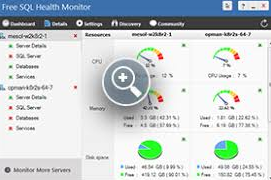In the SQL Monitor allows you to see the actual SQL statement calls through references to the remote server via ODBC or a socket to the ODBC data source.
To open the SQL Monitor,
Select Databases | SQL Monitor.
You may elect to monitor the various activities. Select Options | Options trace to display the following dialog box. This dialog allows you to choose from different categories of activities on the monitor. You can control any number of the following categories:
Prepared queries:
A statement will be sent to the server.
Executed queries:
Statements to be executed on the server. Note that a statement may be prepared and carried out once a few times with different parameters binding.
Input parameters:
Parameters of data sent from the server when performing inserts or updates.
Downloaded data:
Data obtained from the server.
Statement of Operations:
Each operation is performed, such as selection, preparation, execution, and Fetch
Connect / Disconnect:
Operations related to disconnect and connect to databases, including the allocation of a connection handle, freeing the connection handle, if required by the server.
Transactions:
Transaction operations such as start, COMMIT and ROLLBACK (ABORT).
Blob I / O:
Blob data operations, including GET BLOB HANDLE, storing BLOB, and so on.
Miscellaneous:
Operations not covered by other categories.
Provider Errors
Error messages are returned to the server. In the error message may contain an error code, depending on the server.
Vendor Calls
In fact, the functions of API calls to the server. For example, ORLON for Oracle, ISC_ATTACH for InterBase.
Buffer Trace Options dialog page, you can specify how much track information can be stored in memory in the SQL Monitor. You can choose to keep track of all the information in a circular buffer memory, so that once the limit is reached, additional traces should be replaced first. In addition, you can write the following information on a disk file, if the buffer memory becomes full.
To open the SQL Monitor,
Select Databases | SQL Monitor.
You may elect to monitor the various activities. Select Options | Options trace to display the following dialog box. This dialog allows you to choose from different categories of activities on the monitor. You can control any number of the following categories:
Prepared queries:
A statement will be sent to the server.
Executed queries:
Statements to be executed on the server. Note that a statement may be prepared and carried out once a few times with different parameters binding.
Input parameters:
Parameters of data sent from the server when performing inserts or updates.
Downloaded data:
Data obtained from the server.
Statement of Operations:
Each operation is performed, such as selection, preparation, execution, and Fetch
Connect / Disconnect:
Operations related to disconnect and connect to databases, including the allocation of a connection handle, freeing the connection handle, if required by the server.
Transactions:
Transaction operations such as start, COMMIT and ROLLBACK (ABORT).
Blob I / O:
Blob data operations, including GET BLOB HANDLE, storing BLOB, and so on.
Miscellaneous:
Operations not covered by other categories.
Provider Errors
Error messages are returned to the server. In the error message may contain an error code, depending on the server.
Vendor Calls
In fact, the functions of API calls to the server. For example, ORLON for Oracle, ISC_ATTACH for InterBase.
Buffer Trace Options dialog page, you can specify how much track information can be stored in memory in the SQL Monitor. You can choose to keep track of all the information in a circular buffer memory, so that once the limit is reached, additional traces should be replaced first. In addition, you can write the following information on a disk file, if the buffer memory becomes full.

No comments:
Post a Comment